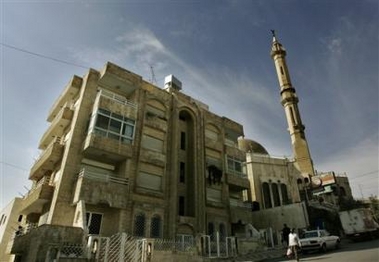|
Jordan's national security adviser resigns
(AP)
Updated: 2005-11-16 08:46
Eleven top Jordanian officials, including the national security adviser,
resigned Tuesday and the government imposed tough new rules aimed at foreigners
in the wake of the deadly hotel bombings.
A fourth American died of wounds sustained in the attacks, according to the
U.S. Embassy, raising the death toll to 58, plus the three bombers. The American
was not further identified.
U.S. National Intelligence Director John Negroponte met top officials in
Amman to praise Jordan's response to the attacks, according to official media,
while interrogators questioned the sole surviving member of the attack team
about al-Qaida's network in Iraq.

A mosque minaret is
seen next to an apartment building used as a safe house where police
arrested the would-be bomber Sajida Al-Rishawi Sunday in the city of
Amman, Jordan, Tuesday, Nov. 15, 2005.[AP] | Two Interpol forensic experts also came to Amman to "exchange information and
expertise in the field of fighting crime," the state-run Petra news agency said.
More details emerged about Sajida Mubarak al-Rishawi, the would-be bomber
arrested Sunday following the triple suicide bombings carried out by her husband
and two 23-year-old Iraqis on the Radisson SAS, Grand Hyatt and Days Inn hotels.
In a televised confession, al-Rishawi has said her 22-pound explosives belt
failed to detonate, though her husband's did, killing more than 20 wedding
partygoers at the Radisson.
Al-Qaida in Iraq, led by Jordanian Abu Musab al-Zarqawi, claimed
responsibility for the Nov. 9 attacks in an Internet statement.
Two of al-Rishawi's friends said three of her brothers, including a known
al-Qaida in Iraq cell leader in the former insurgent bastion of Fallujah, were
killed by U.S. forces last year. The friends, from Iraq's troubled western
province of Anbar, spoke on condition of anonymity because they feared
retribution from militants.
It was unclear if her brother's deaths spurred al-Rishawi to take part in the
plot or if she was influenced by her 35-year-old husband, who appeared to be the
attack cell leader.
Police believe al-Rishawi, who comes from Ramadi in western Iraq, may provide
vital clues to al-Qaida in Iraq and possibly al-Zarqawi's whereabouts. But her
interrogation is going slowly among an increasing sense she played only a small
part in the operation.
The questioning is expected to last a month and she will be tried in a
Jordanian military court, where she could be charged with conspiring to carry
out a deadly terrorist attack, a crime that can carry the death penalty.
Interior Minister Awni Yirfas announced new regulations Tuesday aimed at
keeping foreign militants from operating covertly in Jordan, including a demand
that Jordanians notify authorities within 48 hours of any foreigners renting an
apartment or house.
"Violators of this regulation will face legal ramifications," Yirfas said
without elaborating.
The rules require that authorities be given the names, nationalities and
passport details of any foreigner renting a property.
"Usually I give such information about any foreign tenants I have, but I
think the move is necessary now as a result of the attacks," said property owner
Suleiman Rakan, whose building faced a block in western Amman's Tlaa' Ali suburb
where the hotel bombers rented a safe house.
No details were given for the resignations of the 11 top officials, who
included national security adviser Saad Kheir and Faisal Fayez, the Royal Court
chief and a former prime minister.
But the bombings sparked national outrage and raised concerns over the
handling of the country's national security services.
Jordan has also started drafting new anti-terrorism laws that will likely be
ready for parliament debate early next year, an Interior Ministry official said.
The laws propose allowing any suspect to be held for questioning indefinitely
and imposing penalties on those who put lives or property at risk — inside or
outside the country, the official said. He spoke on condition of anonymity
because he was not authorized to speak to the media.
Anyone condoning or justifying terror actions or supporting them financially
will face penalties under the proposals, he added.
Jordanian security forces already wield far-reaching powers to arrest and
hold suspects. The news laws would be the country's first specifically designed
to counter terrorism.
|